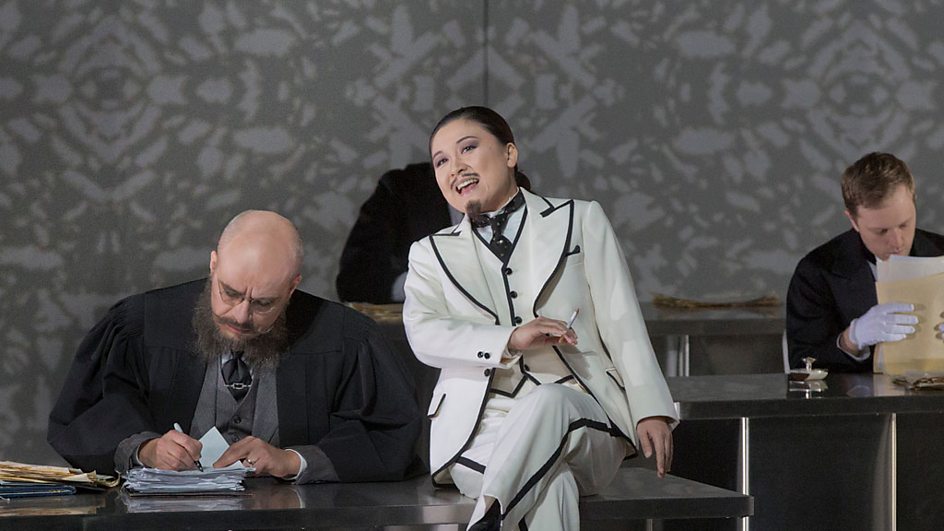[This is
copied from the New York Times.]
Saying ‘It’s Miraculous for Me,’ Levine Will Conduct Again at Met
By DANIEL J. WAKIN
Published: October 11, 2012
James Levine is "overwhelmingly happy to be coming back."
Mr. Levine conducting the Met Orchestra in Mozart's "Serenade No. 9 in D Major" at Carnegie Hall last year.
Defying opera world doubters who thought he was too ill, weak or disengaged, the longtime and much loved music director of the Metropolitan Opera plans to return to the podium for the first time in two years, for a May 19 performance by the Met Orchestra at Carnegie Hall and for three productions at the opera house next season.
Mr. Levine, 69, once a workhorse of the baton, has been plagued by health problems since 2006, leading to a drip-drip of cancellations over recent years. A fall in the summer of 2011 that caused severe damage to his spine forced him to bow out of all of last season and cancel involvement this season while he recovered. He hasn’t led a performance since May 14, 2011, when he conducted Wagner’s “Walküre.”
“I’m overwhelmingly happy to be coming back,” Mr. Levine said in a telephone interview on Wednesday. “It’s miraculous for me.”
Peter Gelb, the Met’s general manager, gave the news to the executive committee of the trustees late on Thursday afternoon and planned to tell the company before the evening’s performance.
Mr. Gelb said Fabio Luisi, the principal conductor who was brought in to fill the void left by Mr. Levine’s absences, would remain in the position to preserve musical continuity for the orchestra, but it was not immediately clear how he and Mr. Levine would share responsibilities.
In the interview Mr. Levine disclosed details about his condition. He remains unable to walk because of the spinal damage and acknowledged what many had suspected for a while: he has a nonprogressive condition related to Parkinson’s disease that causes hand tremors, which his doctors called “benign Parkinsonism.”
Mr. Levine said he would conduct from a motorized wheelchair that he uses. Met technicians are devising a podium that mechanically rises and falls, like an elevator, for Carnegie Hall and the Met pit.
The Met’s plans now call for Mr. Levine to lead a revival of Mozart’s “Così Fan Tutte” (nine performances), starting on Sept. 24; a new production of Verdi’s “Falstaff” (10 performances), starting on Dec. 6; a revival of Berg’s “Wozzeck” (five performances), starting March 6, 2014; and the second half of the “Così” run, starting on April 23, 2014. He is also scheduled to conduct three Carnegie Hall performances with the orchestra next season, as well as the concert in May.
Mr. Levine, who even before the fall walked with a cane or used a wheelchair and conducted sitting down, said he was on the mend and hoped to regain limited mobility soon. He said that the fall caused complete paralysis in his legs, but that he has recovered sensation and movement, if not the ability to walk.
“For the first few weeks, I could have been reading a newspaper while somebody was moving my leg, and I wouldn’t have known he was moving it,” Mr. Levine said.
Mr. Levine said that he had had the Parkinson’s-related condition since 1994, and that on its own it did not interfere with his conducting. But he explained that the severe pain from back problems would make it worse, resulting in a more pronounced tremor and greater impact on his legs. A Parkinson’s medication he took, L-dopa, “contributed to the shaking in his legs and left hand,” the Met said in a statement.
Mr. Levine has been going into the Met regularly since early September, he said, for administrative meetings, to coach singers in the young artists program and to listen to auditions. He said he would pick up the pace of rehearsing cast members for future productions toward the end of the year.
The whole idea, he said, is to “do what I used to do and then some, because you always learn a lot.”
Mr. Levine’s health woes began in 2006, when he fell onstage in Boston and tore a rotator cuff. A malignant cyst led to the removal of a kidney two years later. Then came three more operations: to repair a herniated disk; to correct curvature of the spine and spinal cord compression; and to fix a nerve problem resulting from the spinal surgery. He resigned as music director of the Boston Symphony Orchestra in early 2011 because of his condition.
Then, that August, he fell down several steps while on vacation and suffered the spinal injury. While the Met held out hope that Mr. Levine would return, he ended up announcing cancellations for this season and last, including high-profile cycles of Wagner’s “Ring,” where Mr. Levine is often considered at his most revelatory. Each cancellation brought intense scrutiny, given his deep association with one of the nation’s most important arts institutions. He has conducted at the Met since 1971 and became its music director in 1976. His tenure has shaped the musical standards of the house and put his mark on several generations of singers.
In Mr. Levine’s absence the Met turned to one of his regular substitutes, Mr. Luisi, the Italian maestro, and named him principal conductor.
Mr. Luisi “understood all along that Jim’s intention was to return,” Mr. Gelb said. “He has a very important role with the orchestra.”
With patrons and operagoers often asking when Mr. Levine would be back, Mr. Gelb came under pressure to make a decision about Mr. Levine’s long-term status, but he said he would not act as long as there was any shred of hope that Mr. Levine could someday conduct.
Matters became acute this fall, as the Met prepared for its 2013-14 season announcement in February. If Mr. Levine were out, substitutes had to be found. His doctors — two neurologists and a spine surgeon — agreed that their patient was recovering enough to go back to work eventually.
In an unusual display of openness, the Met, with Mr. Levine’s permission, released statements from the doctors. They said that his upper-body strength was stronger than it had been in years because of rehabilitation. He was pain-free and unencumbered by the benign Parkinsonism. “His prognosis is good,” said Dr. Patrick O’Leary, a spine surgeon at the Hospital for Special Surgery in Manhattan.
Given so many dashed hopes in the past that Mr. Levine would come back, Mr. Gelb said, “it has to be really clear that his return is credible this time.”
Mr. Levine said it was difficult discussing his medical issues.
“I was brought up in a time when if you had a difficulty like that, it was just good form to solve it and keep your own counsel, if you could,” he said. “Now we live in a different time.”
He said he was also reluctant to mention his benign Parkinsonism to avoid “the very dire idea” associated with it in people’s minds.
Mr. Levine said he would juggle a heavy load of rehabilitative therapy with his increasing Met duties. In a certain sense, those tasks will merge, he added.
“My life commitment is to the Met, and I love the Met so,” he said. “My doctors also think that besides being able to recommend that I should come back, they are ready to say I’m likely to be helped by it as well.”
A version of this article appeared in print on October 12, 2012, on page A1 of the New York edition with the headline: Saying ‘It’s Miraculous for Me,’ Levine Will Conduct Again at Met.








































.jpg)



